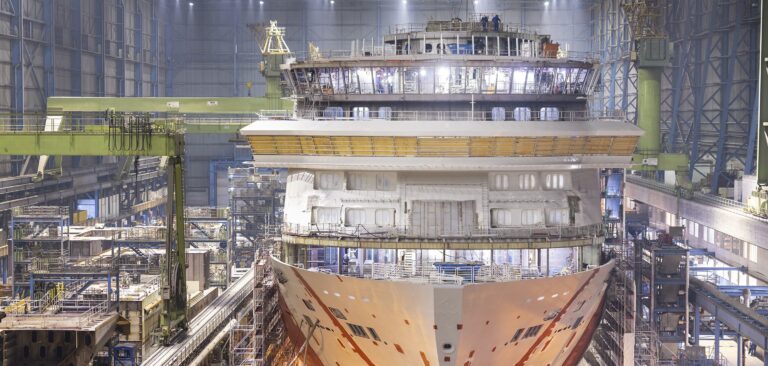Freudenberg e-Power Systems, the Meyer Werft shipyard and the Royal Caribbean Group are collaborating on the development of a new fuel cell system for maritime applications.
The project, which has been underway for several years, aims to design and develop a maritime fuel cell system at a large scale to power the Royal Caribbean Group’s Nova class vessels. Upon completion, the group’s fuel cell installation is intended to cover the full hotel load of a vessel and enable zero local emissions in port.
During the project the partners have been faced with the challenge of reforming liquefied natural gas into usable hydrogen at scale for a shipboard environment. This resulted in a delay in terms of onboard implementation of the system. It is estimated that the first maritime demonstrator system will be completed later this year, as the group continues to develop the solution for a full-scale application.
The Silver Nova – currently under construction in Papenburg, Germany, and scheduled to begin operations in summer 2023 – is stated to be one of the world’s most sustainable cruise ships.
“We are bringing the best minds together to develop fuel cells at scale for the cruise industry by piloting the application on a Nova class ship and expect to complete the necessary approvals in line with IMO regulations later this year,” said Thomas Weigend, managing director, Meyer Werft.
“The strategic cooperation between Royal Caribbean, Meyer Werft and Freudenberg e-Power Systems is groundbreaking for emissions reduction in the cruise industry,” commented Dr Max Kley, CEO, Freudenberg e-Power Systems. “The combination of fuel cells providing high efficiency and a long lifetime with Freudenberg’s very powerful battery systems is tailored to the high demands of the maritime sector.”
“Innovation is in our DNA and as pioneers in this industry, we comprehend the challenges that come with futureproofing any new technology,” said Harri Kulovaara, executive vice president, maritime, Royal Caribbean Group. “To ensure seamless functionality and operability, the integration of this complex system in our ships is critical. Collaborations such as this advance our sustainability journey and, together with Meyer Werft and Freudenberg, we remain committed to supporting the continued research and development of this cutting-edge technology.”



